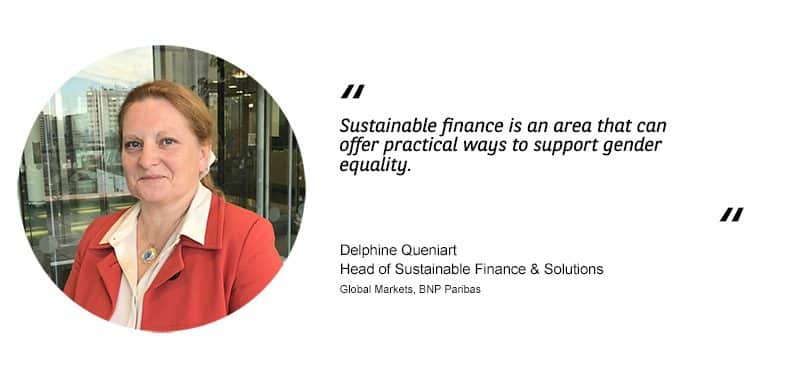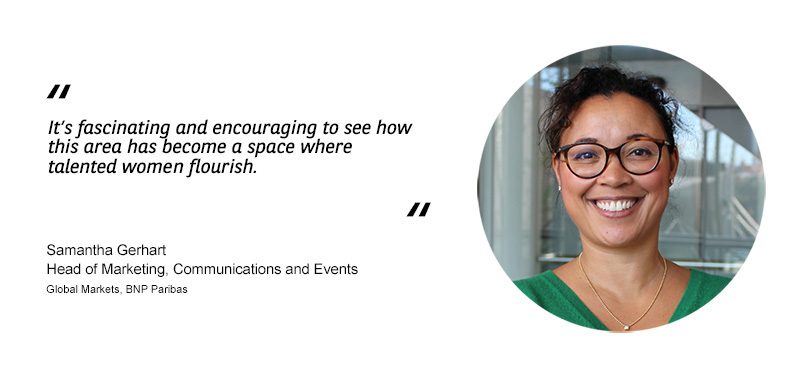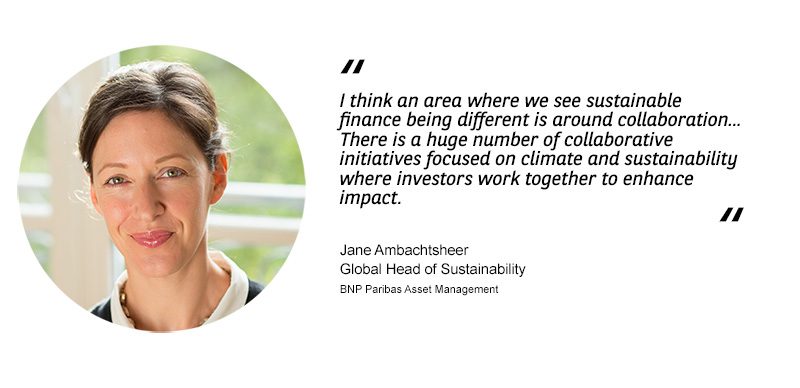Part 1: How sustainable finance found its gender balance
While the urgency of the world’s environmental, social and governance (ESG) issues has put sustainable finance at the crux of the fight for a just transition to a low-carbon economy, another crucial change is taking place behind the scenes of finance: the visibility of women in the sustainable finance space is growing, propelling them as the leading actors of the ESG revolution.
Why does this particular enclave of financial services deliver so much in the way of career growth and opportunity for women? What is it about sustainable finance that lends itself to this positive trend, where other areas lag behind? And what does the future look like as the scope of sustainable finance widens?
In a new series of publications, BNP
Paribas Global Markets partners with Purpose Union – a specialist social
purpose strategy firm – to speak to women at the helm of sustainable finance
divisions in asset management about this area’s unique gender make-up, and what
this means for finance as a whole.

“Diversity is recognised as giving companies and societies an edge. As sustainable finance combines financing with positive impact and considers ESG criteria in investment decisions, it is an area that can offer practical ways to support gender equality,” commented Delphine Queniart, Head of Sustainable Finance and Solutions at BNP Paribas Global Markets and a founder member of the bank’s Women in Global Markets UK initiative.
“As
sustainable finance becomes increasingly relevant and timely, it’s fascinating
and encouraging to see how this area has become a space where talented women
flourish,” added Samantha Gerhart, Head of Marketing, Communications and Events
for BNP Paribas Global Markets and also a founder member of Women in Global
Markets UK.

According to Acre, a recruitment and talent development company, there has been an encouraging trajectory for women in the sustainable finance space over the past five years, as 44% of the top ESG jobs Acre has helped recruit for have gone to women. This stands in stark contrast to other parts of the financial industry where – according to a McKinsey report – women account for only 19% of the “C-suite” top managers.
The first article in this series examines how sustainable finance has evolved as a space within the financial industry where women can grow their careers, asking what brings them to this area and how their careers progress there.
Sustainable finance calling
Beyond a genuine interest in sustainability, some interviewees felt a sense of alignment between stereotypical female traits pertaining to collaborative thinking and doing good for society and the environment, and the nature of the work. One commented that gender-related discrimination experienced by women makes them more compassionate towards other forms of inequality, both environmental and social.
The sense of a distinct, inclusive
environment was another common feature for interviewees. One of the biggest
benefits of the culture in sustainable finance appears to be the high level of
collaboration between individuals and teams, even among organisations.

Another interviewee recounted that a man in her team noted how surprisingly friendly and welcoming the atmosphere was even with competitors.
Others also felt that they had had entered the field opportunistically in its infancy.
While sustainable finance has in the past been undervalued and seen as a mere side branch of traditional finance, it has offered a new foothold for women because of its relative obscurity compared to male-dominated mainstream finance. For some of the women interviewed, ESG was perceived as the area where things were done nicely and ethically rather than an area of finance as strategically significant as any other.
Moreover, several interviewees alluded to
the fact that men did not consider sustainable finance as a profitable area of
finance nor understand the value of going into that kind of business.
Long considered as a niche area of the
finance industry, women were able to build these businesses while male
colleagues did not seem to see opportunity in them. But do these women really
perceive this area as a space for them? And how does this fit into the industry
and society’s views on gender equality?
Progress towards gender equality?
Despite enjoying greater representation and playing an influential role, women in sustainable finance still perceive the complex gender dynamics of the finance sector, and more broadly society in general.
“Well, the barriers when you speak about women in
finance, they’re still more or less the same, right?”
— Petra Stassen – van Lochem, Senior Responsible Investment
Specialist at NN Investment Partners (EU Headquarters)
While overall numbers of women in sustainable finance may be higher than elsewhere in the industry, some respondents see them as lower in certain kinds of post and more senior roles.
Despite the greater proportions of women in sustainable finance, gender stereotypes seem to put up the same barriers as in society at large, with men seen as making up the majority of decision-makers with money management-associated roles.
A few interviewees noted that even though there were women with senior roles such as head of ESG or head of ROI, they did not have direct investment responsibility within asset managers.
However, with a growing visibility of women in senior positions in sustainable finance compared to the rest of the industry, the area does seem to provide a pathway towards gender equality.
Will more men in sustainable finance shift the balance?
With the increasing urgency of the climate
crisis and the impact of Covid-19, sustainable finance is no longer an
underestimated area of finance. It has become a large-scale, innovative and
necessary driver of change in today’s society, attracting a wider range of
profiles – including an increasing number of men.
Multiple factors could explain the surge of
men’s interest in sustainability.
- Profitability: With this growing visibility – and profitability – of sustainable finance, there is anecdotal evidence that the field is now becoming much more attractive for men, as our interviewee above mentioned.
- Diversification of skills:
sustainable finance will also increasingly be shaped by fintech, AI and big
data modelling. As the low numbers of women in fintech show (7% according to Deloitte),
new industries can foster historical inequalities. Future gender equality in
sustainable finance may depend as much on advancing women’s expertise in
coding, programming and data analysis as on existing skill sets.
An interviewee stated that everyone in the sustainable finance space recognises the need of diverse types of skill sets bringing all the necessary expertise together in order to deliver in this fast-paced area of finance. It is thanks to this multi-scale approach that we can address the complexity of sustainability challenges. - New generation: no longer a niche area, sustainable finance is attracting people who are more conscious of and concerned about social inequalities and environmental issues, something that will be explored in the second part of this series.
- Regulation: the regulatory sector has an enormous role in shaping sustainable finance. Because it is enforcing frameworks for sustainable finance to strengthen investment strategies, it has therefore become more appealing to a wider group, including men.
“I think the fact that it’s become so important in terms
of the regulatory requirements in Europe means that the stakeholders tend to be
both male and female, because it’s becoming a prerequisite.”
—Lupin Rahman, Head of EM Sovereign Credit, PIMCO (US headquarters)
Women were prevalent among the pioneers who first saw the potential of sustainable finance. Whether this was because they identified with the inequities tackled by the sector, or seized a nascent growth opportunity, the result was a much-needed space where they could thrive. While the area is not immune to gender barriers and stereotyping, sustainable finance stands above the rest of the industry in terms of opportunities for women.
The worlds of finance and sustainability, and our perception of gender roles
across society, are all evolving, and that evolution is becoming increasingly
intertwined. This creates a unique opportunity for women to grow their careers
in sustainable finance.
The growing visibility – and profitability
– of sustainable finance is making it an attractive field for an increasing
number of both women and men. The second article in this series will ask what
the next generation of its leaders will look like. As the skill sets driving
sustainable finance evolve, will the gender make-up of this business remain the
same?
